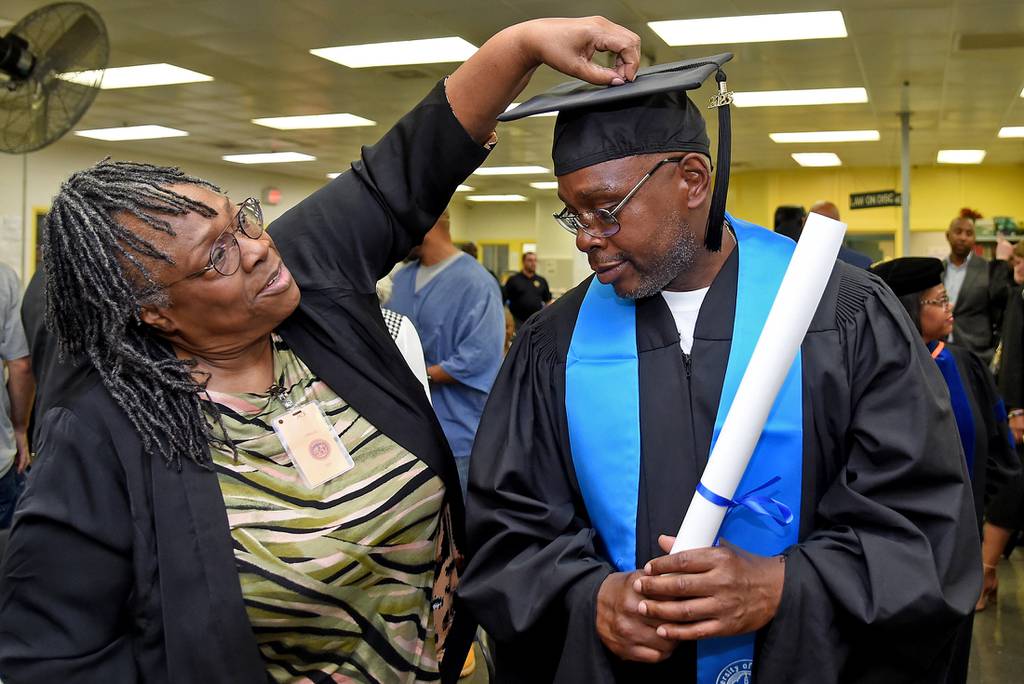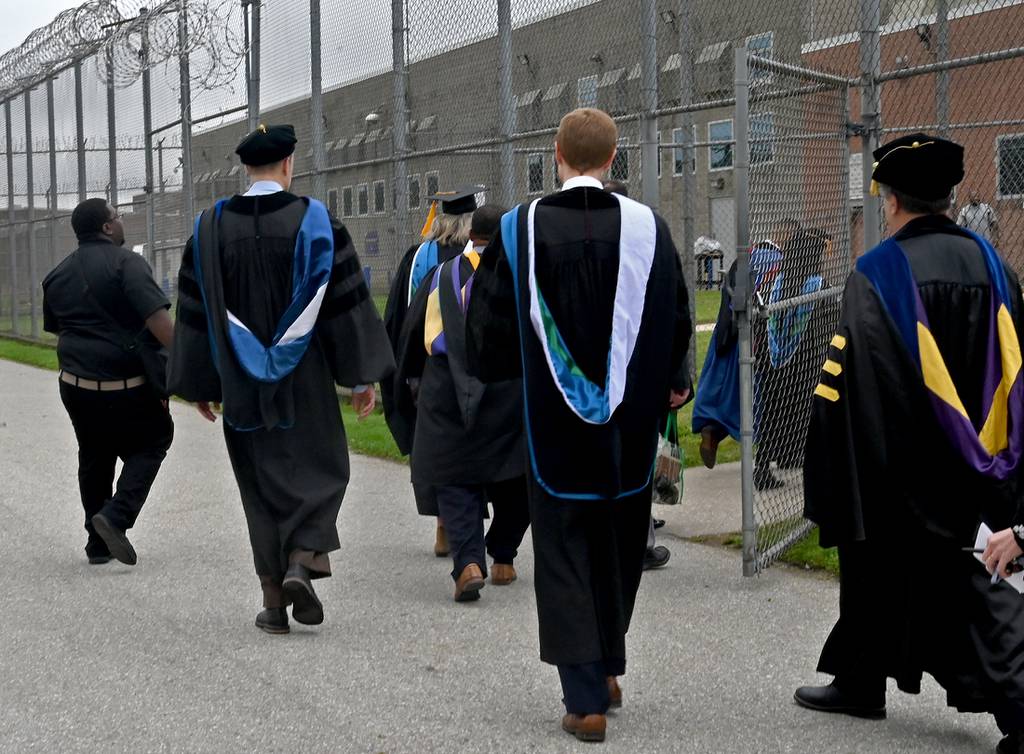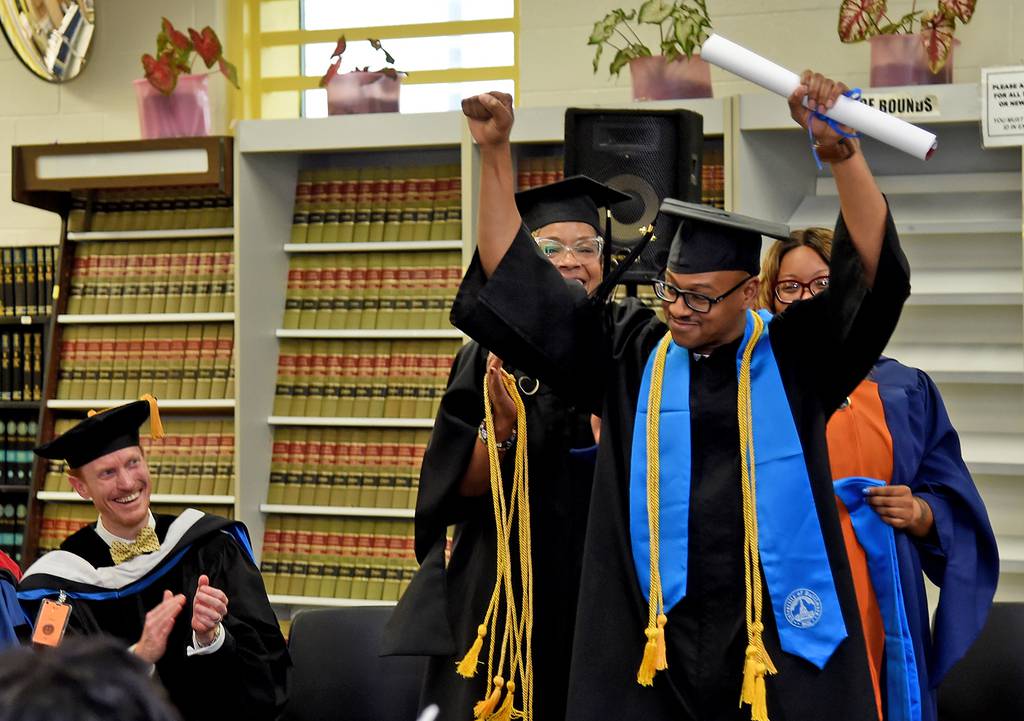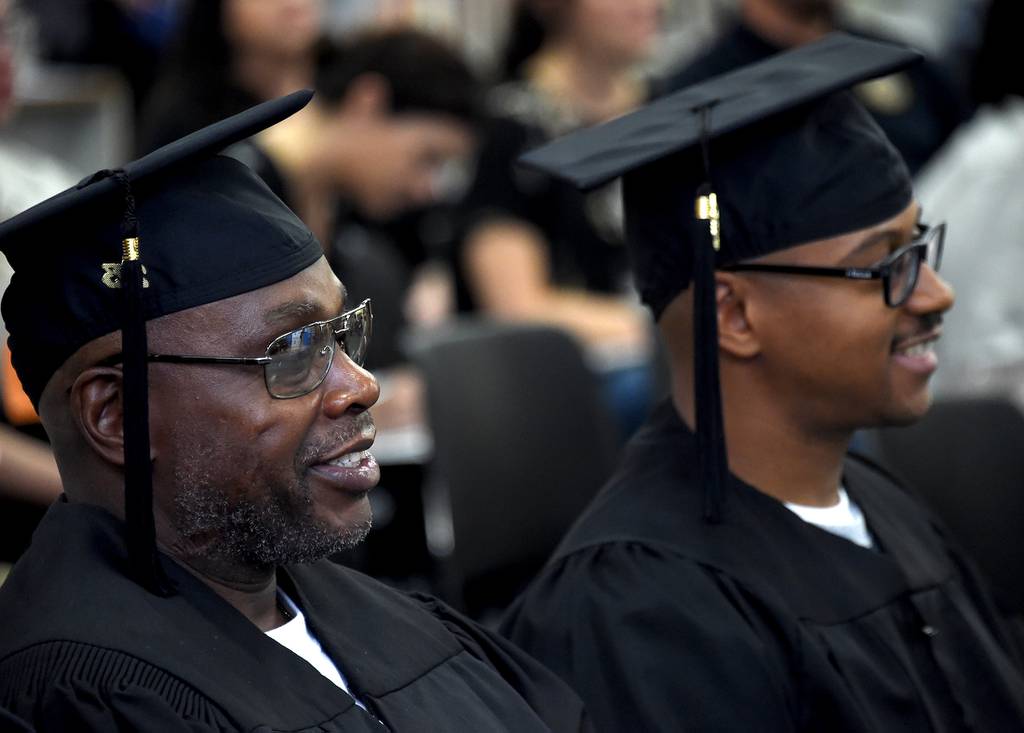Five men in graduation caps and gowns filed into front-row seats to cheers and applause.
As University of Baltimore faculty sang the men’s praises, large loops of barbed wire were just visible through windows bookending the podium.
It was graduation day. Time to celebrate earning bachelor’s degrees in what their valedictorian called the “worst environment possible”: prison.
The students marched across the maximum security prison’s library, where they’d taken more than half of their college credits. Each smiled, shook hands, and posed for photos with their diplomas, before eagerly moving the tassels on their caps from right to left. One graduate joyfully tossed his cap in the air.
The Oct. 6 commencement, the first held by the university at Jessup Correctional Institution, honored “students who were given a second chance, and took it,” said Tiffaney Parkman, director of the school’s human services program.
“This day belongs to you,” she told them.
University of Baltimore’s Second Chance College Program is one of several that offer credit courses within Maryland prisons. Such programs have expanded as the federal government has in recent years increased access to need-based Pell Grants.
Higher education in prison has been associated with double-digit drops in rates of reoffending, thus potentially reducing tax dollars spent on incarceration, and fewer violent incidents in prison.
[ His college career began in prison and finished onstage with a degree ]
On a personal level, for the five new graduates, going to college was the fulfillment of dreams that once felt out of reach.
Valedictorian Bradford Bass, 35, said after the ceremony that he “didn’t think this day was possible.” Though most of his family members earned degrees, he thought he’d be left out due to his incarceration for attempted second-degree murder. When he heard about an opportunity to earn college credits at Jessup, he thought it was a rumor.
Now, he expects to be released from prison by next year, and will leave with a bachelor’s degree in human services and a minor in business management. He maintained the cohort’s highest GPA, finishing at 3.92. As he reminded everyone with a smile: ”Bradford Bass, always had the highest GPA in the class!”
Michael White, 51, another graduate, recalled promising his mother and godfather in the mid-1980s that he would go to college.
“With the trials of life, we had some detours,” White said. “I say I came from the back door in. But I’m coming out the front doors, with a degree.”

The Second Chance program’s first students, selected in 2016, are the “definition of resilient,” program director Andrea Cantora said in her remarks. They overcame the challenges of learning during a pandemic, from prison, with limited access to technology.
“Facts,” one current student commented from a back row.
There are 46 UB students enrolled at Jessup. Many, wearing matching gray UB T-shirts, filled the rows at the back of the library and delivered some of the loudest cheers. An additional 12 people enrolled at the university’s main campus were formerly incarcerated.
Three students from the first cohort have graduated following their release from prison and collected their degrees at the main campus. Two attended the graduation earlier this month at Jessup, congratulating classmates who earned diplomas while incarcerated. One man who earned his degree while incarcerated did not attend the Oct. 6 ceremony; counting him, the program has graduated nine people.
[ A man served 34 years for killing another teen. Now he mentors youth to avoid his mistakes. ]
Goucher College, which has its main campus in Towson, has long operated an education program at two other prisons in Jessup. Since 2012, students have earned 27 college degrees, either from Goucher or using Goucher credits at another school. An additional eight are expected to graduate this academic year, said Eliza Cornejo, who leads the program.
In recent years, a wave of other area schools have restarted or launched their own programs. Bowie State University began last year to offer a bachelor’s degree in sociology and a certificate program, also at Jessup Correctional Institution. Georgetown University started a bachelor’s program last year at the Patuxent Institution in Jessup, and Wor-Wic Community College this summer resumed certificate courses at Eastern Correctional Institution in Somerset County.
Towson University officials hope to start offering an “interdisciplinary degree” next fall to men incarcerated at the Maryland Correctional Training Center in Hagerstown, said Elyshia Aseltine, the faculty director for the school’s Fair Chance Higher Education Initiative. She noted there are fewer higher education programs available at prisons beyond Jessup.
Interest in college courses from the prison population remains high. When the University of Baltimore program launched in 2016, it got 150 applicants. There are now 50 on a waitlist. When Georgetown’s program started last year, it received 300 applications for 25 spots, said spokeswoman Evelyn Rupert.
The “immense amount of interest,” she said, “really speaks to the demand for college education in prisons.”




During the graduation, state Public Safety and Correctional Services Secretary Carolyn Scruggs called the cohort the “pivotal foundation of what education should look like behind bars.”
She said in an interview the agency wants to create a “robust” education environment for the prison population, including high school equivalency opportunities and dozens of occupational skills and training opportunities in fields such as auto mechanics, barbering and carpentry.
Improving rehabilitation efforts and decreasing the likelihood that someone convicted of a crime will reoffend would have particular significance for Baltimore. The city’s residents make up 9% of Maryland’s total population, but 40% of the state prison population, according to a Prison Policy Initiative analysis of U.S. census data. One in every 100 Baltimore City residents is incarcerated in a state prison, the group’s 2022 report found.
Expanding prison education programs also has racial equity implications: Maryland’s incarcerated population is 71.2% Black, according to fiscal year 2021-22 data from the correctional services department. About a third of the state’s overall population is Black, according to census data.
[ Proportion of Maryland black prison population is more than double the national average of 32% ]
Students in prison are “hungry for education,” said Judith Lichtenberg, a philosophy professor who has taught courses for the University of Baltimore in Jessup Correctional Institution and is this semester teaching with Georgetown University at Patuxent.
Lichtenberg said teaching in those environments exposes instructors to the “injustices” students “laboring under.” She noted that some students have been incarcerated for up to 20 years and are “very different” from who they once were.




Both of the Second Chance program’s earlier graduates present for the most recent commencement are continuing their studies outside prison. James Ruffin III plans to pursue a master’s degree in supply chain management at Towson in the spring. Kelly Gillis will study finance in graduate school at the University of Baltimore.
Before prison, Gillis went to culinary school and was a cook. “Real” college was never in his mind, he said. But when he saw the opportunity, he took advantage — and now believes there should be even more opportunities for rehabilitation in prison.
The Morning Sun
Daily
Get your morning news in your e-mail inbox. Get all the top news and sports from the baltimoresun.com.
White agrees. University of Baltimore’s latest cohort “got in the trenches” with one another, he said, creating study groups and embracing the mantra “No man left behind.”
The program gave students a second chance, he said — one that could be even more widely available in prison.
“Give people a fair chance to succeed, compete, reshape their lives,” said White, who is in prison for convictions of murder and assault.
When he’s released in March, White hopes to start a clothing line or operate a food truck (cooking is his “art in life”). He also wants to get involved in a nonprofit to help the younger generation avoid taking the path he did.
White’s mother, his best friend and his fiancee attended the commencement, and said they were eager to see his release and the start of his “life’s journey.” The program, they agreed, prepared him to make an impact.
“If you’re going to take me from my family, then rehabilitate me. Don’t send me out the same person I came in,” White said.
“Here was my opportunity.”




This post was originally published on this site be sure to check out more of their content.






